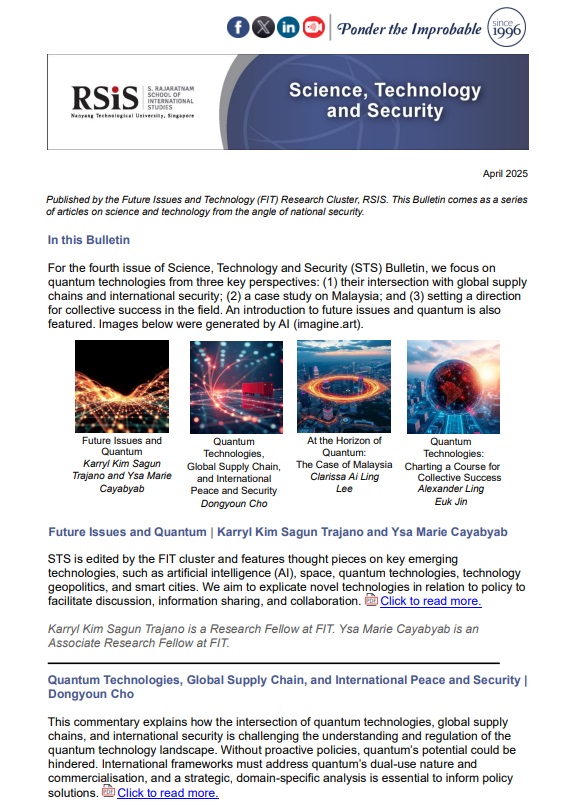14 April 2025
- RSIS
- Publication
- RSIS Publications
- Science, Technology and Security: Quantum (April 2025)
Future Issues and Quantum | Karryl Kim Sagun Trajano and Ysa Marie Cayabyab
STS is edited by the FIT cluster and features thought pieces on key emerging
technologies, such as artificial intelligence (AI), space, quantum technologies, technology
geopolitics, and smart cities. We aim to explicate novel technologies in relation to policy to
facilitate discussion, information sharing, and collaboration. Click to read more.
Karryl Kim Sagun Trajano is a Research Fellow at FIT. Ysa Marie Cayabyab is an
Associate Research Fellow at FIT.
Quantum Technologies, Global Supply Chain, and International Peace and Security | Dongyoun Cho
This commentary explains how the intersection of quantum technologies, global supply
chains, and international security is challenging the understanding and regulation of the
quantum technology landscape. Without proactive policies, quantum’s potential could be
hindered. International frameworks must address quantum’s dual-use nature and
commercialisation, and a strategic, domain-specific analysis is essential to inform policy
solutions. Click to read more.
Dongyoun Cho is a Senior Researcher in the Security & Technology Programme at the
United Nations Institute for Disarmament Research, and an Assistant Professor in the
Department of Military Studies at Seokyeong University, Republic of Korea.
At the Horizon of Quantum: The Case of Malaysia | Clarissa Ai Ling Lee
This commentary delves into how Malaysia’s policy discussions on security and science
have evolved from AI to quantum technologies. While quantum technology remains less
visible than nuclear technology, quantum’s dual-use nature has raised security concerns.
Malaysia’s current safeguard regulations respond more to socio-economic-political-legal
conditions, and its approach to acquiring quantum computational infrastructure relies on
vendor-supplier model. Click to read more.
Clarissa Ai Ling Lee is a lecturer at Monash University Malaysia, and was previously a
postdoctoral fellow at Multimedia University, Malaysia.
Quantum Technologies: Charting a Course for Collective Success | Alexander Ling
Euk Jin
This commentary discusses how quantum technology is moving from an open
collaborative global system towards closed-off ecosystems, thus hindering progress and
increasing development costs. Likewise, the rapid advances in quantum technology are at
risk due to increasing geopolitical contestation. As 2025 marks the International Year of
Quantum Science and Technology, could fostering global cooperation accelerate quantum
technology’s benefits for humanity? Click to read more.
Alexander Ling Euk Jin is a Principal Investigator at the Centre for Quantum Technologies,
and a member of the Department of Physics at the National University of Singapore. He
also co-founded two quantum technology spinoffs.
Future Issues and Quantum | Karryl Kim Sagun Trajano and Ysa Marie Cayabyab
STS is edited by the FIT cluster and features thought pieces on key emerging
technologies, such as artificial intelligence (AI), space, quantum technologies, technology
geopolitics, and smart cities. We aim to explicate novel technologies in relation to policy to
facilitate discussion, information sharing, and collaboration. Click to read more.
Karryl Kim Sagun Trajano is a Research Fellow at FIT. Ysa Marie Cayabyab is an
Associate Research Fellow at FIT.
Quantum Technologies, Global Supply Chain, and International Peace and Security | Dongyoun Cho
This commentary explains how the intersection of quantum technologies, global supply
chains, and international security is challenging the understanding and regulation of the
quantum technology landscape. Without proactive policies, quantum’s potential could be
hindered. International frameworks must address quantum’s dual-use nature and
commercialisation, and a strategic, domain-specific analysis is essential to inform policy
solutions. Click to read more.
Dongyoun Cho is a Senior Researcher in the Security & Technology Programme at the
United Nations Institute for Disarmament Research, and an Assistant Professor in the
Department of Military Studies at Seokyeong University, Republic of Korea.
At the Horizon of Quantum: The Case of Malaysia | Clarissa Ai Ling Lee
This commentary delves into how Malaysia’s policy discussions on security and science
have evolved from AI to quantum technologies. While quantum technology remains less
visible than nuclear technology, quantum’s dual-use nature has raised security concerns.
Malaysia’s current safeguard regulations respond more to socio-economic-political-legal
conditions, and its approach to acquiring quantum computational infrastructure relies on
vendor-supplier model. Click to read more.
Clarissa Ai Ling Lee is a lecturer at Monash University Malaysia, and was previously a
postdoctoral fellow at Multimedia University, Malaysia.
Quantum Technologies: Charting a Course for Collective Success | Alexander Ling
Euk Jin
This commentary discusses how quantum technology is moving from an open
collaborative global system towards closed-off ecosystems, thus hindering progress and
increasing development costs. Likewise, the rapid advances in quantum technology are at
risk due to increasing geopolitical contestation. As 2025 marks the International Year of
Quantum Science and Technology, could fostering global cooperation accelerate quantum
technology’s benefits for humanity? Click to read more.
Alexander Ling Euk Jin is a Principal Investigator at the Centre for Quantum Technologies,
and a member of the Department of Physics at the National University of Singapore. He
also co-founded two quantum technology spinoffs.





